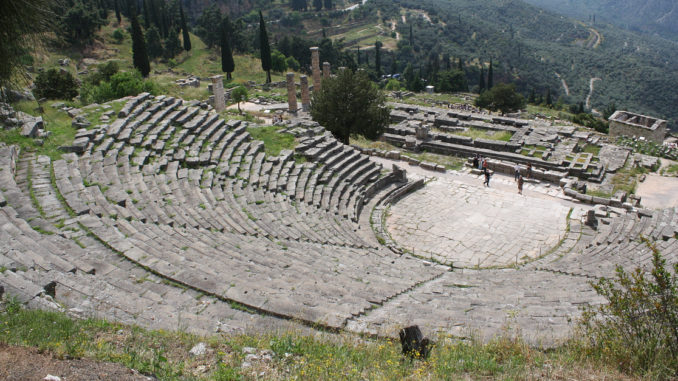
The fame and power of Delphi was based on its oracle, which was one of the oldest in Greece. Nearly all ancient authors mention it at some point, or record some story or incident relating to it. Nevertheless, it would be a mistake to believe that we possess all the information we would wish to have, of all the details we consider necessary, concerning the procedure of divination at Delphi. A great many problems remain unsolved and numerous questions have not yet found an answer. We shall try, therefore, to set down as briefly as possible the results of recent research into the methods of divination at the Delphi oracle.
According to ancient tradition, Panassos, the eponymous hero of Mount Parnassos, discovered the art of reading auguries in the flight of birds: Delphos, the hero of the city Delphi, was the first to teach entrail-reading. and Amphiktyon, the hero of the Amphiktyony, introduced oneiromancy (dream-interpretation). We also know that there existed in the Delphic sanctuary a body priests named Pyrkooi, who could read auguries in the flames of sacrificial pyres. The Delphic myths mention the existence of nymphs known as Thriai – in ancient Greek this word denotes the pebbles used in divination; one can therefore assume that these nymphs were simply the personification of divination by lot. The Delphic myths provide clear enough evidence that every known method of divination was practised at Delphi. But Delphi owed its fame to the oracles delivered by the Pythia, who received direct inspiration from Apollo and spoke in his name; in other words, the god of divination himself delivered the oracle, using the Pythia as a medium.
The Pythia was a woman over 50 years old. She was not necessarily a virgin, bur from the moment she undertook this highest of duties – serving the god – she was under the obligation to abandon her husband and children, to move into a house destined for her alone, within the sacred precinct, to be chaste and irreproachable, and to observe certain religious rules. In spite of her age, she wore the garments of a young girl, as a mark of the virginal purity of her life. We do not know how the Pythia was selected; but it is quite certain that she did not have to belong to a noble family, like the priests and priestesses who served at other Greek sanctuaries; nor did she have to go through special training or education. She was a simple, ordinary peasant woman, without any distinguishing mark until the moment Apollo allowed his inspiration to descend upon her. In the beginning there was only one Pythia; but when the requirements of the oracle grew more numerous, two more Pythias were added.
Until the Classical period, nobody had ever thought of questioning the Pythia’s sudden -transformation and the fact that Phoibos spoke through her. All that has been written about the natural vapours emanating from the chasm in the sanctuary, or about the laurel leaves the Pythia munched and the water she drank is but an attempt to find answers to the mystery, at a time when the faithful began to lose their faith, thinking they could explain the divine miracle with the cold instrument of reason and encompass the supernatural within a recognizable human measure. However, the ancient Greeks were certain of one thing alone: the importance of Apollo’s sacred tripod, in other words, his throne, which had once been equipped with wings and carried him across land and sea. Why had Apollo chosen such an unusual throne, nobody knew and nobody dared ask; nor have any modern scholars provided a certain answer to that question. It was upon this throne that the Pythia sat in order to become the god’s instrument. It was enough for her to take Apollo’s place, to shed her ordinary identity, fall into a trance and deliver the divine messages in a series of mysterious, inarticulate cries. But before the Pythia took her seat upon the tripod, it was necessary to find out whether the god consented to her practicing divination. A goat was therefore brought to sacrifice; but before sacrificing it, the animal was sprinkled with cold water: if it shivered from head to foot, it meant the god consented; if it did not, then the Pythia could not sit on the oracular tripod.
In early antiquity, before the 6th century B.C., divination took place only once a year, on the seventh day of the month Bysios (February-March), on Apollo’s birthday. Later on it took place every month, again on the seventh day of the month, except for the three winter months, because during that time the god left the Delphic sanctuary in order to travel far away to the land of the Hyperboreans, conceding his place to Dionysos, who was worshipped next to Apollo in his own temple. On the sacred day appointed for divination, the Pythia was the first to visit at dawn the Kastalian Spring to cleanse herself. Then she burnt laurel leaves on the sacred hearth and immersed herself in smoke. Meanwhile the priests prepared the sacrificial goat; if the god gave his consent, the animal was sacrificed on the great altar – a dedication of the Chians – in front of the temple, and thus all the pilgrims knew an oracle would be delivered that day at Delphi. In the meantime, the Prophetai and the Hosioi (priests of both Apollo and Dionysos) and certain delegates from the township of Delphi also cleansed themselves in the sacred waters of Kastalia. Finally, all the pilgrims who wished to consult the oracle similarly purified themselves at the spring.
When everyone was ready, they advanced in a festive procession towards the temple, filled with awe and anticipation. Delegates from the cities (theopropoi) and private individuals stood outside the temple and offered the pelanos at the altar – a kind of consecrated bread sold on the spot at a high price, the pilgrims’ first contribution to the sanctuary. Then they each advanced in turn towards the temple and placed a slaughtered animal as an offering upon the inner altar, where the undying flame burned. It was considered a great privilege to be the first to receive an oracle; this was known as ‘promanteia’. The priority was always retained by the people of Delphi for their own city, but second place was offered as the highest sign of honour to cities and individuals who had proved worthy of it.
The Pythia was already seated on the tripod in the adyton or inner shrine. The Prophetai stood nearby, and the pilgrim – it could only be a man – sat in a corner at some distance from her, having already posed his question to one of the Prophetai, either in writing or orally. The Pythia, hidden by some kind of partition, was not visible to anyone. The Prophetes put the question to her and she would give the god’s response, deep in her trance. This was apparently unintelligible to others, but the Prophetes was able to comprehend it and write it down in hexameter verse; it was this written reply that was handed over to the pilgrim. The equivocal replies of the Delphic oracle have become famous in history; they were so obscure, so incomprehensible that additional divinatory gifts were required to interpret them correctly and avoid unfortunate mistakes. The case of Croesus is a good example: in answer to his question, the god said that if he waged war on the Persians, he would destroy a great power; he never suspected that Loxias (a surname of Apollo, meaning the Oblique One, because of the ambiguous replies he was giving) meant to convey that he would destroy his own kingdom if he fought the Persians.
Those nine days of the year when the Pythia spoke with the voice of the god must have had a tremendous impact on the pilgrims fortunate enough to be present in the Delphic sanctuary. Only a very small percentage of those who wished to consult the divine oracle had the privilege of receiving an answer within those nine days in the year when divination was performed. For this reason, since the Archaic age, most of the pilgrims’ questions were answered in a different manner: by drawing lots. This kind of divination took place every day of the year, not in the adyton, but in public view; it was the most common method of divination as regards simple and concrete questions, that is to say questions that could be answered by a simple affirmative or negative. But when we refer to the Pythia and the celebrated oracles delivered at Delphi, we have in mind those great days, when the god himself let his voice be heard through the mouth of the entranced prophetess.
Proudly WWW.PONIREVO.COM



